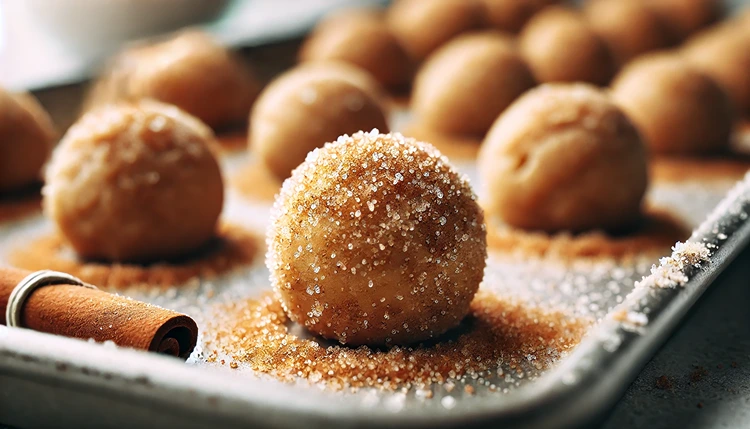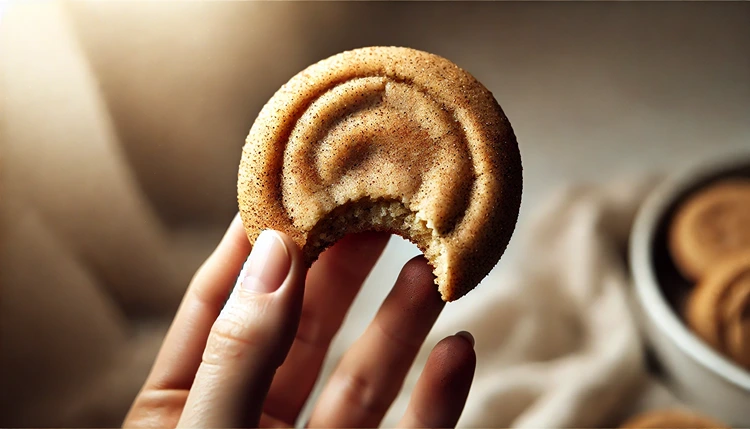When it comes to classic cookies, snickerdoodles are an all-time favorite for many. But what if you’re vegan or trying to cut down on refined sugar? Enter the solution: vegan snickerdoodle cookies with coconut sugar. These cookies offer the same warm, cinnamon-coated goodness without the eggs, dairy, or traditional white sugar. Plus, the use of coconut sugar gives them a slightly caramel-like flavor that elevates them even further. Whether you’re a seasoned baker or just starting out, this recipe will make you wonder why you ever needed the original version.
Why Use Coconut Sugar in Vegan Snickerdoodles?
There’s a reason more people are turning to coconut sugar in their baking, and it’s not just because it sounds trendy. Coconut sugar is a natural sweetener made from the sap of coconut palm trees. It’s less processed than white sugar and contains trace amounts of nutrients like zinc, potassium, and calcium. It also has a lower glycemic index, meaning it won’t spike your blood sugar as quickly as regular sugar.
For vegan snickerdoodle cookies, coconut sugar works wonderfully. Its rich, caramel-like flavor pairs perfectly with the cinnamon coating, giving these cookies an extra depth of flavor. Plus, coconut sugar is less refined, which aligns perfectly with plant-based, wholesome baking. So, if you’re looking to bake snickerdoodles that are kinder to your body and the environment, coconut sugar is the way to go.
What Makes Snickerdoodles Special?
Snickerdoodles have a unique place in the cookie world. Unlike your average sugar cookie, these treats are rolled in cinnamon sugar before baking, giving them that signature sweet-spicy coating. But what really sets snickerdoodles apart is the addition of cream of tartar in traditional recipes, which gives them their slightly tangy flavor and chewy texture.
In a vegan version, we can easily substitute cream of tartar with baking powder, and trust me—the result is just as delightful. The texture remains soft and chewy, with a slightly crisp edge, and the cinnamon sugar coating delivers that comforting warmth in every bite.
Helpful Hint:
Wondering if you can skip the coconut sugar and stick with regular sugar? While it’s possible, the coconut sugar adds a unique flavor and a slight nutritional boost. If you’re in a pinch, feel free to use organic cane sugar, but keep in mind that you’ll lose some of the richness coconut sugar provides.
How to Make Vegan Snickerdoodle Cookies with Coconut Sugar

Now, let’s get to the fun part—making these cookies! Don’t worry if you’re new to vegan baking; this recipe is simple and straightforward. No complicated techniques or hard-to-find ingredients. The focus here is on using everyday vegan-friendly ingredients to create the best-tasting snickerdoodles you’ve ever had.
Vegan Snickerdoodle Cookies with Coconut Sugar
Ingredients
- 1 1/2 cups all-purpose flour
- 1/2 cup coconut sugar
- 1/2 cup vegan butter, softened
- 1/4 cup unsweetened applesauce
- 1 tsp vanilla extract
- 1 tsp baking powder
- 1/4 tsp salt
- 2 tbsp cinnamon (for rolling)
- 2 tbsp coconut sugar (for rolling)
Instructions
- Preheat your oven to 350°F (175°C) and line a baking sheet with parchment paper.
- In a large mixing bowl, cream together the vegan butter and coconut sugar until smooth.
- Add the applesauce and vanilla extract, and mix until well combined.
- In a separate bowl, whisk together the flour, baking powder, and salt.
- Gradually add the dry ingredients to the wet ingredients, mixing until a dough forms.
- In a small bowl, mix together the cinnamon and coconut sugar for rolling.
- Scoop the dough into tablespoon-sized balls, roll them in the cinnamon sugar mixture, and place them on the prepared baking sheet.
- Bake for 10-12 minutes, or until the edges are slightly golden. The centers should remain soft.
- Allow the cookies to cool on the baking sheet for a few minutes before transferring to a wire rack to cool completely.
Nutritional Information
- Calories: 120 per cookie
- Protein: 1.5g
- Fat: 5g
- Sugar: 6g
- Fiber: 1g
Tips for the Perfect Vegan Snickerdoodle Texture
If you’re wondering how to achieve that perfect balance between chewy and crispy, the secret lies in a few simple tips. First, don’t overbake the cookies. These vegan snickerdoodles will look slightly underdone when you take them out of the oven, but they’ll continue to firm up as they cool. Second, chilling the dough for 30 minutes before baking can help control spreading, especially if you’re baking in a warm kitchen.
Another trick is to use room-temperature vegan butter. If the butter is too cold, the dough won’t cream properly with the sugar, resulting in a dense cookie. If it’s too soft or melted, the cookies will spread too much in the oven. Aim for a soft, pliable butter consistency for the best results.
Helpful Hint:
Chilling the dough for at least 30 minutes helps the cookies hold their shape. If you’re in a rush, you can skip this step, but be prepared for slightly flatter cookies.
Can You Freeze Vegan Snickerdoodle Dough?
Yes! Freezing cookie dough is a game-changer for anyone who likes fresh-baked cookies on demand. After you’ve rolled the dough into balls and coated them in cinnamon sugar, place them on a baking sheet and freeze until solid. Once frozen, transfer the dough balls to a freezer-safe bag or container.
When you’re ready to bake, there’s no need to thaw the dough. Just pop them straight into the oven, adding a minute or two to the bake time. This makes it super easy to have fresh vegan snickerdoodle cookies whenever the craving strikes!
For best results, use the frozen dough within three months, although it’s unlikely it will last that long once you get a taste of these cookies.
What Vegan Substitutes Are Best for Snickerdoodles?
One of the best things about vegan baking is the variety of plant-based substitutes available to recreate classic recipes like snickerdoodles. Let’s take a closer look at some common swaps and why they work so well.
Vegan Butter vs. Coconut Oil
For most cookie recipes, including vegan snickerdoodles with coconut sugar, vegan butter is the go-to substitute for dairy butter. Vegan butter provides a similar texture and fat content, which is important for achieving that classic chewy texture. However, if you don’t have vegan butter on hand, coconut oil can work in a pinch. Just keep in mind that coconut oil will make your cookies a bit crispier around the edges and impart a subtle coconut flavor, which can pair well with the caramel notes from the coconut sugar.
Helpful Hint:
If you use coconut oil instead of vegan butter, make sure it’s solid (not melted). This will help control the spreading of the cookies during baking. To achieve a similar texture to butter, you can chill the coconut oil slightly if it’s too soft.
Applesauce as an Egg Replacement
Eggs are typically used in cookie recipes to help bind the ingredients and add moisture. In vegan baking, there are several options for replacing eggs, but applesauce works exceptionally well for snickerdoodles. It adds moisture without overwhelming the flavor and helps to keep the cookies soft and chewy.
If you don’t have applesauce, other options like mashed banana or ground flaxseeds (mixed with water) can also work as egg replacements. Just keep in mind that each substitute brings its own unique texture and flavor, so choose based on what you have and your flavor preferences.
How to Store Vegan Snickerdoodles for Maximum Freshness
Once you’ve baked a batch of vegan snickerdoodle cookies with coconut sugar, you’ll want to keep them fresh for as long as possible. Here are a few tips on how to store your cookies to enjoy them at their best.
Room Temperature Storage
In general, snickerdoodle cookies can be stored in an airtight container at room temperature for about 5-7 days. The key is to ensure they’re completely cool before storing, as any residual heat can create condensation, leading to soggy cookies. Place a piece of parchment paper between layers to prevent sticking and help retain that slightly crisp outer edge.
Freezing for Longer Storage
If you want to keep your cookies for a longer period, freezing them is a great option. Once baked and cooled, place your cookies in a single layer on a baking sheet and freeze until solid. Then, transfer them to a freezer-safe container or ziplock bag. To enjoy them later, let them thaw at room temperature or warm them slightly in the oven.
Frozen cookies can last up to three months, but I doubt they’ll stick around that long once you taste them!
Is Coconut Sugar Healthier than Regular Sugar?
One of the reasons coconut sugar has gained popularity, especially in plant-based and vegan baking, is because it’s often considered a healthier alternative to refined white sugar. While it’s important to note that coconut sugar is still sugar, it does have some advantages over its more processed counterpart.
First, coconut sugar has a lower glycemic index, meaning it causes a slower rise in blood sugar compared to white sugar. This can be beneficial for people trying to manage their blood sugar levels. Coconut sugar also retains small amounts of nutrients like iron, zinc, and potassium, which are lost in the refining process of white sugar.
That said, coconut sugar isn’t a magic bullet—it should still be enjoyed in moderation, but it’s a great alternative if you’re looking for a less processed sweetener with a richer flavor profile.
Helpful Hint:
When substituting coconut sugar for white sugar in other baking recipes, use it at a 1:1 ratio. However, note that coconut sugar is less sweet, so your final product may have a slightly more subtle sweetness. You can balance this by adding a touch more of your preferred sweetener if needed.
How to Get Perfectly Chewy Vegan Snickerdoodles

The texture of a snickerdoodle is what makes it stand out. The combination of a crispy exterior and a chewy interior is perfection. But how can you make sure your vegan snickerdoodle cookies achieve that ideal balance? Here are some tips.
- Don’t overbake. Snickerdoodles should be slightly undercooked when you take them out of the oven. They’ll continue to firm up as they cool, giving you that soft center with crisp edges.
- Chill your dough. This is especially important if you’re using vegan butter, which can soften quickly. Chilling the dough for 30 minutes before baking can help the cookies maintain their shape and prevent excess spreading.
- Use the right baking sheet. A light-colored baking sheet is best for cookies. Dark baking sheets can cause cookies to brown too quickly, which might lead to a crispier result than you want.
Vegan Snickerdoodle Ingredient Swaps
| Traditional Ingredient | Vegan Alternative | Benefits of the Swap |
|---|---|---|
| White sugar | Coconut sugar | Lower glycemic index, caramel-like flavor |
| Dairy butter | Vegan butter or coconut oil | Plant-based, healthier fats, easily available |
| Eggs | Applesauce or flax eggs | Provides moisture, binds ingredients naturally |
| All-purpose flour | Gluten-free flour blend | Makes recipe suitable for gluten-sensitive individuals |
Customizing Your Vegan Snickerdoodles
While this recipe is already pretty perfect, one of the joys of baking is the ability to experiment and add your own spin. Here are a few ways you can customize your vegan snickerdoodle cookies:
Add Chocolate Chips
For a fun twist, try folding in some vegan chocolate chips to the dough. The combination of cinnamon, coconut sugar, and chocolate is a match made in cookie heaven. Just be sure to use a good quality vegan chocolate for the best results.
Swap the Cinnamon for Pumpkin Spice
If you’re baking these snickerdoodles in the fall, consider swapping out the cinnamon in the coating for pumpkin spice. The warm blend of cinnamon, nutmeg, and cloves will give your cookies a festive flavor that’s perfect for autumn.
Try Almond Flour for a Gluten-Free Option
If you’re looking for a gluten-free version, you can try substituting almond flour for the all-purpose flour. Just keep in mind that almond flour is denser, so your cookies may be a bit thicker and more crumbly. But the nutty flavor of almond flour pairs beautifully with the coconut sugar and cinnamon.
FAQs
Wrapping Up
Baking vegan snickerdoodle cookies with coconut sugar is a rewarding experience for both seasoned and new bakers alike. These cookies deliver all the familiar warmth and comfort of a traditional snickerdoodle, while staying true to plant-based principles. The use of coconut sugar not only brings a delicious caramel-like flavor but also provides a more wholesome alternative to refined sugar.








